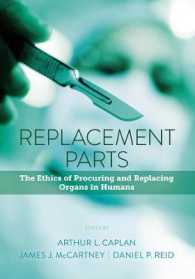基本説明
New in paperback. Hardcover was published in 2008. This updated new edition summarizes the latest developments in cognitive neuroscience related to rehabilitation, reviews the principles of successful interventions and synthesizes new findings about the rehabilitation of cognitive changes in a variety of populations.
Full Description
Now available in paperback, this updated new edition summarizes the latest developments in cognitive neuroscience related to rehabilitation, reviews the principles of successful interventions and synthesizes new findings about the rehabilitation of cognitive changes in a variety of populations. With greatly expanded sections on treatment and the role of imaging, it provides a comprehensive reference for those interested in the science, as well as including the most up-to-date information for the practising clinician. It provides clear and practical guidance on why cognitive rehabilitation may or may not work. How to use imaging methods to evaluate the efficacy of interventions. What personal and external factors impact rehabilitation success. How biological and psychopharmacological changes can be understood and treated. How to treat different disorders of language and memory, and where the field is going in research and clinical application.
Contents
Preface; Part I. Principles of Cognitive Neurorehabilitation: Introduction to Part I George Winocur; 1. Principles of neuroplasticity and behaviour Bryan Kolb and Robbin Gibb; 2. Principles of compensation in cognitive neuroscience and neurorehabilitation Roger A. Dixon, Douglas D. Garrett and Lars Bäckman; 3. The patient as a moving target - the importance to rehabilitation of understanding variability Donald T. Stuss and Malcolm A. Binns; 4. Steroids and allostasis in brain plasticity Richard G. Hunter and Bruce S. McEwan; 5. Principles in conducting rehabilitation research Amy D. Rodriguez and Leslie J. Gonzalez Rothi; 6. Outcome measurement in cognitive neurorehabilitation Nadina Lincoln and Roshan das Nair; 7. Principles in evaluating cognitive rehabilitation research Keith D. Cicerone; Part II. Application of Imaging Technologies: Introduction to Part II Donald T. Stuss; 8. Structural neuroimaging - defining the cerebral context for cognitive rehabilitation Joel Ramirez, Fu Qiang Gao and Sandra E. Black; 9. Functional neuroimaging and cognitive rehabilitation - healthy aging as a model of plasticity Cheryl Grady; 10. Functional brain imaging and neurological recovery Maurizio Corbetta; 11. The role of neuroelectric and neuromagnetic recordings in assessing learning and rehabilitation effects Claude Alain and Bernhard Ross; Part III. Factors Affecting Successful Outcome: Introduction to Part III Ian H. Robertson; 12. Mood, affect and motivation in rehabilitation Omar Ghaffar and Anthony Feinstein; 13. Anosognosia and the process and outcome of neurorehabilitation George P. Prigatano; 14. Psychosocial considerations for cognitive rehabilitation Deirdre R. Dawson and George Winocur; 15. Exercise, cognition, and dementia Erik Scherder and Laura Eggermont; 16. Is there a role for diet in cognitive rehabilitation? Matthew Parrott and Carol E. Greenwood; Part IV. Pharmacological and Biological Approaches: Introduction to Part IV George Winocur; 17. Pharmacologic approaches to cognitive rehabilitation Thomas W. McAllister and Amy F. T. Arnsten; 18. Pharmacologic treatment of cognitive impairment after traumatic brain injury John Whyte; 19. Pharmacological interventions for cognition in dementia John M. Ringman and Jeffrey L. Cummings; 20. Neurogenesis-based regeneration in the adult brain, is it feasible? J. Martin Wojtowicz; 21. The impact of cerebral small vessel disease on cognitive impairment Harry Vinters and S. Thomas Carmichael; 22. Intrinsic and extrinsic neural stem cell treatment of central nervous system injury and disease Trudi Stickland, Samuel Weiss and Bryan Kolb; Part V. Behavioural/Neuropsychological Approaches: Introduction to Part V Ian H. Robertson and Donald T. Stuss; 23. The use of constraint-induced movement therapy (CI therapy) to promote motor recovery following stroke David Morris and Edward Taub; 24. Effects of physical activity on cognition and brain Arthur Kramer, Kirk Erickson and Edward McAuley; 25. Aphasia Susan A. Leon, Stephen Nadeau, Michael de Riesthal, Bruce Crosson, John C. Rosenbek and Leslie J. Gonzalez Rothi; 26. Rehabilitation of neglect Victoria Singh-Curry and Masud Husain; 27. Rehabilitation of frontal lobe functions Brian Levine, Gary R. Turner and Donald T. Stuss; 28. Executive functioning in children with traumatic brain injury in comparison to developmental ADHD Gerri Hanten and Brian Levine; 29. Rehabilitation of attention following traumatic brain injury Jennie Ponsford; 30. Memory rehabilitation for people with brain injury Barbara A. Wilson and Narinder Kapur; 31. Memory rehabilitation in older adults Elizabeth L. Glisky and Martha Glisky; Part VI. Overview: 32. The future of cognitive neurorehabilitation Ian H. Robertson and Susan M. Fitzpatrick.







